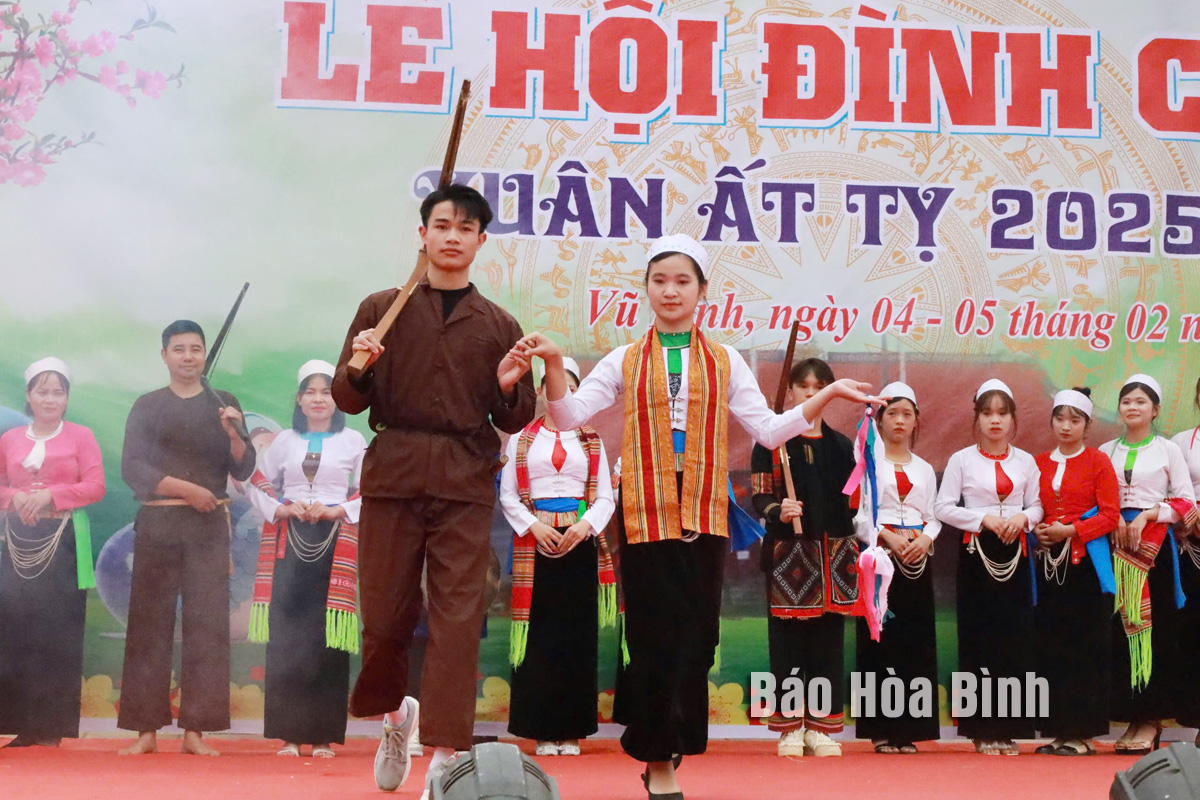
Held biennially on the seventh and eighth days of the Lunar New Year, the Coi communal house festival in Vu Binh commune, Lac Son district, honours Hoang Ba Quoc Mau, her sons - King Cun and King Hai - along with local deities who contributed to agricultural and social development. Beyond its spiritual significance, the festival offers visitors an immersive experience of Muong ethnic culture.

A showcase of traditional Muong attire at the Dinh Coi Festival aims to introduce and promote Muong cultural identity to visitors.
Muong
folk singing, particularly thuong rang bo meng and hat dup giao duyen, is a
festival highlight, attracting large crowds. Renowned Muong folk artist Bui Van
Chinh expressed pride in preserving and showcasing this cultural heritage,
noting the growing enthusiasm of both locals and tourists.
Festival-goers
also witness agricultural rituals accompanied by sacred Cheo Dinh dances and
resonant gong beats. Considered an auspicious start to the farming season, the
ceremonies reflect hopes for favorable weather, bountiful harvests, and
national prosperity. The event also fosters community spirit and cultural
appreciation.
Following
the rituals, vibrant folk performances and traditional games bring the festival
to life. First-time visitor Le Diem Thao from Hanoi praised the well-organised
festivities, particularly the interactive folk games such as nem con (throwing
cloth balls), di ca kheo (stilt walking), and danh mang (bamboo percussion).
Ethnic sports like stick pushing and tug-of-war, alongside modern activities
like volleyball, further energised the celebrations.
The
2025 festival saw an expanded programme, including a Muong ethnic costume
contest with 40 participants and a gong performance competition among hamlet
teams.
Deputy
Chairman of the commune People's Committee Bui Minh Tang emphasised that the
festival, blending tradition with modern cultural exchanges, has become a key
spiritual tourism event.
Thousands
of visitors attended, engaging in cultural experiences, exploring local
customs, and enjoying OCOP-certified specialties. The event not only promotes
cultural preservation but also stimulates tourism and economic growth in the
region.
With an increasingly vibrant and widespread emulation movement aimed at building cultured residential areas and cultured families, Yen Thuy District has been making steady progress toward improving both the material and spiritual well-being of its people, while fostering a civilized, prosperous, beautiful, and progressive community.
Once lacking recreational spaces and community facilities, Residential Group 2 in Quynh Lam Ward (Hoa Binh City) has recently received attention for the construction of a new, spacious, and fully equipped cultural house. The project followed the model of state support combined with public contributions in both labor and funding.
The "All people unite to build cultural life" movement, which has been effectively integrated with Kim Boi district’s socio-economic development goals, is fostering a lively spirit of emulation across local residential areas, hamlets, villages, public agencies, and enterprises. In addition, through the initiative, traditional cultural values are being preserved and promoted, while community solidarity and mutual support in poverty reduction and economic development are being strengthened.
A working delegation of the Hoa Binh provincial People’s Committee led by its Permanent Vice Chairman Nguyen Van Toan on June 11 inspected the progress of a project to build the Mo Muong Cultural Heritage Conservation Space linked to tourism services in Hop Phong commune, Cao Phong district.
Born and growing in the heroic land of Muong Dong, Dinh Thi Kieu Dung, a resident in Bo town of Kim Boi district, in her childhood was nurtured by the sweet lullabies of her grandmother and mother. These melodies deeply imprinted on her soul, becoming an inseparable part of her love for her ethnic group's culture. For over 20 years, this love for her hometown has driven Dung to research, collect, and pass down the cultural values of the Muong people to future generations.
In the final days of May, the Ethnic Art Troupe of Hoa Binh Province organized performances to serve the people in remote, mountainous, and particularly disadvantaged areas within the province. These were not just ordinary artistic shows, but they were the meaningful journeys aimed at spreading cultural values, enhancing the spiritual life of the people and contributing to the preservation of ethnic minority cultural identities.



